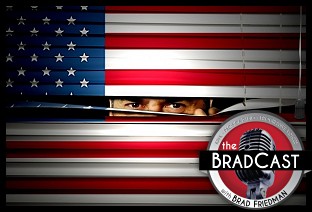 The plaintiffs in One Wisconsin Institute v. Thomsen, one of several long-running court challenges to Wisconsin Republicans' strict Photo ID voting restriction, have filed an emergency petition with the full en banc U.S. 7th Circuit Court of Appeal, asking that it overturn its previous photo ID decision in Frank v. Walker.
The plaintiffs in One Wisconsin Institute v. Thomsen, one of several long-running court challenges to Wisconsin Republicans' strict Photo ID voting restriction, have filed an emergency petition with the full en banc U.S. 7th Circuit Court of Appeal, asking that it overturn its previous photo ID decision in Frank v. Walker.
The still pending Frank case as well as the One Wisconsin challenge have, to say the least, undergone a circuitous recent history in a number of federal courts that oversee Badger State election law.
In April 2014, after a lengthy trial, U.S. District Court Judge Lynn Adelman struck down and permanently enjoined Wisconsin's photo ID law after finding it in violation of both the 14th Amendment to the U.S. Constitution as well as the Voting Rights Act (VRA).
Republicans in control of the state naturally appealed that detailed and blistering ruling. The federal appeal was assigned to an all-Republican three-judge 7th Circuit panel, headed by Judge Frank H. Easterbrook. Easterbrook is a member of the radical right wing Robert Bork-founded, Koch Brothers-funded "Federalist Society". The ensuing decision to reinstate Wisconsin's photo ID law, despite Adelman's meticulous ruling in the lower court, was so extraordinarily partisan, factually deficient, riddled with errors and legally flawed that it prompted the ordinarily staid U.C. Irvine election law Prof. Rick Hasen to tweet: "I rarely just rant in my blog posts. But Judge Easterbrook caused me to blow a gasket."
Other members of the 7th Circuit were so troubled by Easterbrook's flawed opinion that they took the unusual move of granting a rehearing en banc on their own motion. Because of prior refusals by Congressional Republicans to fill a vacancy on the 7th Circuit with an Obama nominee, at that time of the court's motion there were only ten (10) jurists serving on the full 7th Circuit --- as opposed to the allotted eleven (11) judges. The ensuing 5-5 en banc ruling --- now referred to as Frank I --- left Easterbrook's horribly flawed ruling in place, effectively disenfranchising nearly 10% of Wisconsin's electorate who did not possess or have easy access to the very specific types of Photo ID now required by state Republicans to cast a vote. .
Last April, however, after a disastrous Presidential primary in Wisconsin, where, most visibly, student voters were forced into hours long lines on Election Day in hopes of obtaining a state approved photo ID that would allow them to vote under the GOP law, the Easterbrook panel handed down a decision that appeared designed to ameliorate the widespread disenfranchisement. The ruling --- now referred to as Frank II --- suggested that disenfranchised voters who lack the ability "to obtain a qualifying photo ID with reasonable effort" should be permitted to cast a regular ballot nonetheless.
On July 19, 2016, in what was thought to be compliant with the Frank II directive, the District Court issued a remedial injunction that mandated Wisconsin afford the right to cast a regular ballot to "those who cannot with reasonable effort obtain a qualifying ID", so long as they signed an affidavit to that effect at the polling place. Many, like The Nation's Ari Berman, celebrated, believing that the voting rights of Wisconsin's disenfranchised electorate had finally been restored.
That celebration, it now appears, proved both premature and an underestimate of the level partisan duplicity on the part of the three "radicals in robes" on the Easterbrook 7th Circuit panel...


 'A World of Tyrants,
'A World of Tyrants, 'Green News Report' 5/22/25
'Green News Report' 5/22/25
 'Dangerous Times': Climate Scientist Warns Trump 'Censorship' Endangering Nat'l Security: 'BradCast' 5/21/25
'Dangerous Times': Climate Scientist Warns Trump 'Censorship' Endangering Nat'l Security: 'BradCast' 5/21/25 And Then They Came for Members of Congress...: 'BradCast' 5/20/25
And Then They Came for Members of Congress...: 'BradCast' 5/20/25 'Green News Report' 5/20/25
'Green News Report' 5/20/25 Appeals Court Blocks Last Route for Voters to Challenge Violations of the VRA: 'BradCast' 5/19/25
Appeals Court Blocks Last Route for Voters to Challenge Violations of the VRA: 'BradCast' 5/19/25 Sunday 'Now Hoarding' Toons
Sunday 'Now Hoarding' Toons Mad World:
Mad World: 'Green News Report' 5/15/25
'Green News Report' 5/15/25 Plane Corruption and the Future of the DOJ: 'BradCast' 5/14/25
Plane Corruption and the Future of the DOJ: 'BradCast' 5/14/25 'Deeply Evil': GOP Proposes Largest Medicaid Cuts in History: 'BradCast' 5/13/25
'Deeply Evil': GOP Proposes Largest Medicaid Cuts in History: 'BradCast' 5/13/25 'Green News Report' 5/13/25
'Green News Report' 5/13/25 And Then They Came for the Mayors...: 'BradCast' 5/12/25
And Then They Came for the Mayors...: 'BradCast' 5/12/25 Sunday 'New Guy, Old Guy' Toons
Sunday 'New Guy, Old Guy' Toons Blowing Smoke. At the Vatican and White House: 'BradCast' 5/8/25
Blowing Smoke. At the Vatican and White House: 'BradCast' 5/8/25 'Green News Report' 5/8/25
'Green News Report' 5/8/25 SCOTUS Weighs Public Funding of Religious Schools: 'BradCast' 5/7/25
SCOTUS Weighs Public Funding of Religious Schools: 'BradCast' 5/7/25 Trump Judge Blocks NC GOP Theft of 2024 Supreme Court Seat: 'BradCast' 5/6/25
Trump Judge Blocks NC GOP Theft of 2024 Supreme Court Seat: 'BradCast' 5/6/25 Prosecutors Quit After U.S Attny Strikes Deal With Felon Cop: 'BradCast' 5/5/25
Prosecutors Quit After U.S Attny Strikes Deal With Felon Cop: 'BradCast' 5/5/25 Trump Losing Streak Continues into SECOND Hundred Days: 'BradCast' 5/1/25
Trump Losing Streak Continues into SECOND Hundred Days: 'BradCast' 5/1/25 100 Daze (w/ Digby and Driftglass): 'BradCast' 4/30/25
100 Daze (w/ Digby and Driftglass): 'BradCast' 4/30/25 Campaign to 'Impeach Trump Again' Gains Fresh Momentum: 'BradCast' 4/29/25
Campaign to 'Impeach Trump Again' Gains Fresh Momentum: 'BradCast' 4/29/25 And Then They Came for the Judges...: 'BradCast' 4/28/25
And Then They Came for the Judges...: 'BradCast' 4/28/25 Trump EPA Guts Enviro Justice Office: 'BradCast' 4/24/25
Trump EPA Guts Enviro Justice Office: 'BradCast' 4/24/25
 VA GOP VOTER REG FRAUDSTER OFF HOOK
VA GOP VOTER REG FRAUDSTER OFF HOOK Criminal GOP Voter Registration Fraud Probe Expanding in VA
Criminal GOP Voter Registration Fraud Probe Expanding in VA DOJ PROBE SOUGHT AFTER VA ARREST
DOJ PROBE SOUGHT AFTER VA ARREST Arrest in VA: GOP Voter Reg Scandal Widens
Arrest in VA: GOP Voter Reg Scandal Widens ALL TOGETHER: ROVE, SPROUL, KOCHS, RNC
ALL TOGETHER: ROVE, SPROUL, KOCHS, RNC LATimes: RNC's 'Fired' Sproul Working for Repubs in 'as Many as 30 States'
LATimes: RNC's 'Fired' Sproul Working for Repubs in 'as Many as 30 States' 'Fired' Sproul Group 'Cloned', Still Working for Republicans in At Least 10 States
'Fired' Sproul Group 'Cloned', Still Working for Republicans in At Least 10 States FINALLY: FOX ON GOP REG FRAUD SCANDAL
FINALLY: FOX ON GOP REG FRAUD SCANDAL COLORADO FOLLOWS FLORIDA WITH GOP CRIMINAL INVESTIGATION
COLORADO FOLLOWS FLORIDA WITH GOP CRIMINAL INVESTIGATION CRIMINAL PROBE LAUNCHED INTO GOP VOTER REGISTRATION FRAUD SCANDAL IN FL
CRIMINAL PROBE LAUNCHED INTO GOP VOTER REGISTRATION FRAUD SCANDAL IN FL Brad Breaks PA Photo ID & GOP Registration Fraud Scandal News on Hartmann TV
Brad Breaks PA Photo ID & GOP Registration Fraud Scandal News on Hartmann TV  CAUGHT ON TAPE: COORDINATED NATIONWIDE GOP VOTER REG SCAM
CAUGHT ON TAPE: COORDINATED NATIONWIDE GOP VOTER REG SCAM CRIMINAL ELECTION FRAUD COMPLAINT FILED AGAINST GOP 'FRAUD' FIRM
CRIMINAL ELECTION FRAUD COMPLAINT FILED AGAINST GOP 'FRAUD' FIRM RICK SCOTT GETS ROLLED IN GOP REGISTRATION FRAUD SCANDAL
RICK SCOTT GETS ROLLED IN GOP REGISTRATION FRAUD SCANDAL VIDEO: Brad Breaks GOP Reg Fraud Scandal on Hartmann TV
VIDEO: Brad Breaks GOP Reg Fraud Scandal on Hartmann TV RNC FIRES NATIONAL VOTER REGISTRATION FIRM FOR FRAUD
RNC FIRES NATIONAL VOTER REGISTRATION FIRM FOR FRAUD EXCLUSIVE: Intvw w/ FL Official Who First Discovered GOP Reg Fraud
EXCLUSIVE: Intvw w/ FL Official Who First Discovered GOP Reg Fraud GOP REGISTRATION FRAUD FOUND IN FL
GOP REGISTRATION FRAUD FOUND IN FL



















 On today's
On today's  On today's
On today's  The new USA Freedom Act has just
The new USA Freedom Act has just  Just in from Senator Feingold (D-WI), on the
Just in from Senator Feingold (D-WI), on the 

 UPDATE 8:10pm PT: Following the (supposedly) "centrist" response to the SOTU, offered up by the scared-to-death Democratic "leadership", in the person of Kansas Governor Kathleen Sibelius, a real response to Bush's SOTU was sent out by Senator Russ Feingold (D-WI). The short response follows below in full, and serves to remind us what reality looks like...
UPDATE 8:10pm PT: Following the (supposedly) "centrist" response to the SOTU, offered up by the scared-to-death Democratic "leadership", in the person of Kansas Governor Kathleen Sibelius, a real response to Bush's SOTU was sent out by Senator Russ Feingold (D-WI). The short response follows below in full, and serves to remind us what reality looks like... Paul Kiel at TPM has an
Paul Kiel at TPM has an  As
As 
 In a statement just sent to
In a statement just sent to  Of course, Bush didn't. He
Of course, Bush didn't. He  "We don't have a law that would make war profiteering specifically a federal crime," Sen. Leahy (D-VT) said in this morning's efficient hearing conducted by the Senate Judiciary Committee, so he is
"We don't have a law that would make war profiteering specifically a federal crime," Sen. Leahy (D-VT) said in this morning's efficient hearing conducted by the Senate Judiciary Committee, so he is 












